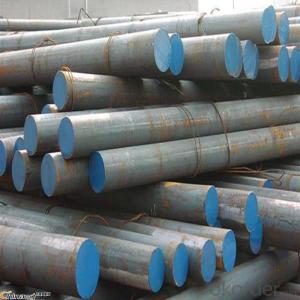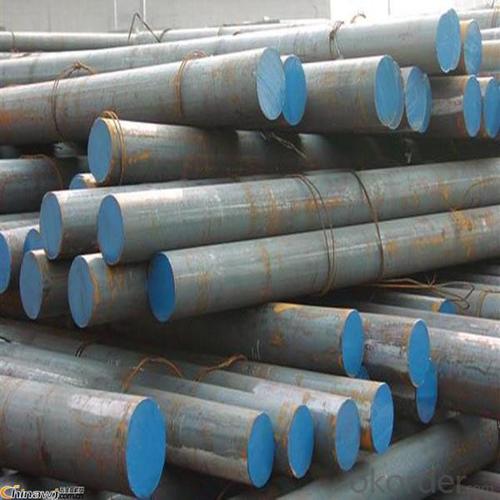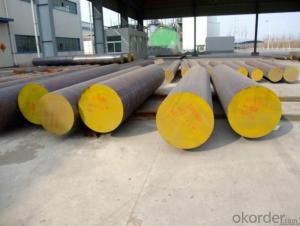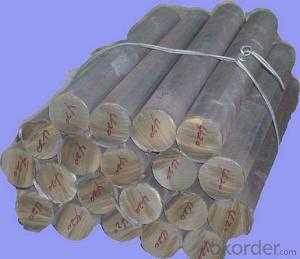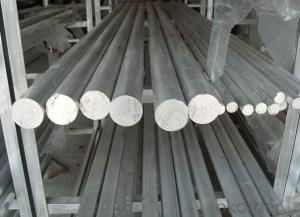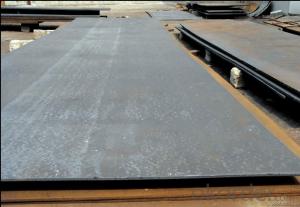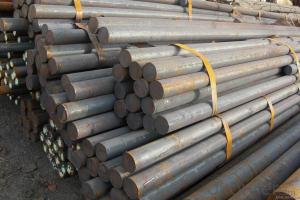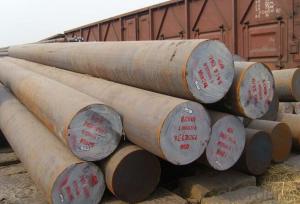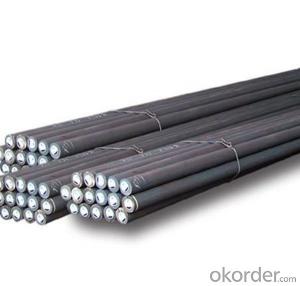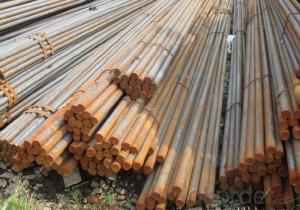3Cr2Mo Die Steel Special Steel Alloy Steel
- Loading Port:
- China main port
- Payment Terms:
- TT OR LC
- Min Order Qty:
- 25 m.t.
- Supply Capability:
- 10000 m.t./month
OKorder Service Pledge
OKorder Financial Service
You Might Also Like
Specification
Specifications
1.ISO9001:2008 certificate
2.Competive price and Best quality
3.On-time delivery
Chemical Composition(GB)%
C | Si | Mn | Cr | Mo | S | P |
0.34 | 0.5 | 0.8 | 1.7 | 0.42 | ≤0.030 | ≤0.030 |
Standard
GB | ASTM | DIN |
3Cr2Mo | P20 | 1.2311 |
Available Size
Rolled Plate:20-400mm×610mm×L
Heat Treatment
Item | Temperature℃ | Hardness |
Anneal | 710-740 | ≤220HB |
Quenching | 850-880 | 52-55HRC |
Tempering | 580-630 | 28-35HRC |
Characterstics
1.Good comprehensive mechanical properties
2.excellent polishing performance and weld reapiring propery
Applications: Suitable for large or medium sized and precise plastic moulds


1, Your advantages?
professional products inquiry, products knowledge train (for agents), smooth goods delivery, excellent customer solution proposale
2, Test & Certificate?
SGS test is available, customer inspection before shipping is welcome, third party inspection is no problem
3, Payment Terms?
30% TT as deposit and 70% before delivery.
Irrevocable L/C at sight.
4, Trading Terms?
EXW, FOB, CIF, FFR, CNF
6, After-sale Service?
We provides the services and support you need for every step of our cooperation. We're the business partner you can trust.
For any problem, please kindly contact us at any your convenient time.
We'll reply you in our first priority within 24 hours.
- Q: How is stainless tool steel used in the manufacturing of surgical instruments?
- Stainless tool steel is commonly used in the manufacturing of surgical instruments due to its exceptional properties such as corrosion resistance, durability, and high hardness. These qualities make it suitable for producing sharp, long-lasting cutting edges on surgical instruments like scalpels, forceps, scissors, and bone saws. The stainless tool steel ensures that the surgical instruments remain sterile, withstand repeated sterilization processes, and maintain their sharpness, thus maximizing their longevity and effectiveness in surgical procedures.
- Q: How is special steel used in the aerospace manufacturing process?
- Special steel is used in the aerospace manufacturing process primarily for its strength, durability, and resistance to extreme temperature and pressure conditions. It is commonly employed in the construction of critical components such as turbine blades, landing gear, and structural parts of aircraft. The unique properties of special steel enable it to withstand the demanding environments and ensure the safety and reliability of aerospace systems.
- Q: What are the different heat treatment furnaces used for special steel?
- Special steel is commonly subjected to various heat treatment processes using different types of furnaces. Each furnace serves a specific purpose and is engineered to create the ideal heating and cooling conditions necessary for the steel to attain its desired properties. One of the furnaces employed for special steel is the annealing furnace. This furnace utilizes a technique called annealing, which entails heating the steel to a specific temperature and then gradually cooling it to enhance its softness and ductility. To prevent oxidation during the process, annealing furnaces are often equipped with controlled atmospheres. Another type of furnace utilized for special steel is the quenching furnace. Quenching is a process that involves rapidly cooling the steel to increase its hardness. Quenching furnaces are designed to provide the required cooling rate and may utilize specialized cooling mediums like oil or water to achieve the desired outcome. Tempering furnaces are also commonly employed for special steel. Tempering involves heating the steel to a specific temperature and subsequently cooling it to enhance its toughness and reduce brittleness. These furnaces enable precise temperature control throughout the tempering process. Furthermore, carburizing furnaces are utilized for special steel. Carburizing is the process of introducing carbon into the surface of the steel to enhance its hardness. Carburizing furnaces are equipped with controlled atmospheres and designed to provide the necessary temperatures and carbon-rich environments for the carburizing process. In summary, the various heat treatment furnaces used for special steel serve distinct purposes such as annealing, quenching, tempering, or carburizing. These furnaces are meticulously engineered to provide the requisite heating and cooling conditions for the steel to achieve its desired properties.
- Q: What are the main factors affecting the impact toughness of special steel?
- Various factors influence the impact toughness of special steel and other materials. The impact toughness of special steel can be affected by the following main factors: 1. Composition: The impact toughness of the steel is greatly influenced by its chemical composition. Adding elements like carbon, manganese, silicon, nickel, and molybdenum can enhance the toughness of the steel. Higher carbon content generally increases hardness but decreases toughness, while alloying elements like nickel and molybdenum can improve toughness. 2. Heat treatment: The impact toughness of special steel can be significantly altered by the heat treatment process, including quenching and tempering. Proper heat treatment can refine the steel's microstructure, making it more resistant to fractures and increasing its toughness. 3. Microstructure: The toughness of the steel is heavily influenced by its microstructure, including the size, shape, and distribution of its grains. Fine-grained steels generally exhibit better toughness compared to coarse-grained ones. The presence of certain phases, such as martensite or bainite, can also impact the impact toughness. 4. Inclusions: The presence of non-metallic inclusions, such as sulfides, oxides, or carbides, in the steel can act as stress concentration points and reduce its impact toughness. High-quality special steels often undergo processes like vacuum degassing or electroslag remelting to minimize these inclusions. 5. Processing conditions: The manufacturing processes used to produce special steel can affect its impact toughness. Factors like forging, rolling, or extrusion conditions, as well as the cooling rate during solidification, can impact the microstructure and, consequently, the toughness of the steel. 6. Temperature: The impact toughness of special steel varies with temperature. Some steels exhibit good toughness at low temperatures, while others perform better at higher temperatures. The temperature at which the steel is used or tested is an important factor to consider when evaluating its impact toughness. It is important to note that standardized tests, such as the Charpy or Izod test, are often used to determine the impact toughness of special steel. These tests involve subjecting a notched specimen to impact loading and provide valuable information on the steel's ability to absorb energy and resist fracture under impact conditions.
- Q: Can special steel be used in the manufacturing of cutting-edge technology products?
- Absolutely, cutting-edge technology products can certainly benefit from the use of special steel. Renowned for its exceptional strength, durability, and resistance to corrosion, special steel proves itself as an ideal material for various applications within the technology sector. Take, for instance, the manufacturing of smartphones, where special steel can be employed for the casing, ensuring exceptional protection against impact and scratches, all while maintaining a sleek and contemporary design. Furthermore, precision components for advanced machinery, such as robotics or medical devices, can be flawlessly crafted using special steel, given its imperative attributes of high strength and unrivaled reliability. In summary, special steel boasts myriad advantages, rendering it an optimal choice for the production of cutting-edge technology products.
- Q: What are the requirements for special steel used in aircraft manufacturing?
- The critical nature of aircraft components and the demanding operating conditions they face necessitate stringent requirements for the special steel used in their manufacturing. Here are several key requirements that must be met: 1. Exceptional strength: To withstand the extreme forces and loads experienced during flight, special steel used in aircraft manufacturing must possess exceptionally high strength. This is crucial for maintaining the structural integrity and safety of the aircraft. 2. Lightweight: While strength is important, the special steel used in aircraft must also be lightweight. This is to minimize the overall weight of the aircraft, which in turn enhances fuel efficiency and allows for increased payload capacity. 3. Excellent corrosion resistance: Aircraft are often exposed to harsh environments, including high humidity, saltwater, and various chemicals. Therefore, the special steel used in their manufacturing must exhibit excellent resistance to corrosion. This helps to maintain the structural integrity of the aircraft and prolong its lifespan. 4. High fatigue resistance: Special steel must possess high fatigue resistance to withstand the repetitive loading and unloading cycles that occur during flight. This ensures that the components do not fail prematurely due to cyclic stress. 5. Heat resistance: The special steel should be able to withstand the high temperatures generated by the engines and the heat generated during high-speed flight. This prevents deformation, melting, or loss of strength under extreme thermal conditions. 6. Good weldability: The special steel used in aircraft manufacturing should have good weldability, which allows for efficient and reliable joining of components during the manufacturing process. This ensures strong and secure connections between various parts of the aircraft. 7. Non-magnetic properties: In certain applications, such as electronic systems, it is essential for the special steel to be non-magnetic. This is to prevent interference with sensitive equipment. 8. Traceability and certification: To meet industry standards and regulatory requirements, the special steel must have proper traceability and certification. This includes documentation of its composition, manufacturing process, and testing procedures to ensure consistent quality and performance. Meeting these requirements is vital to ensure the safety, reliability, and efficiency of aircraft. Before being used in the construction of aircraft components, the special steel undergoes rigorous testing, quality control, and certification processes to ensure it meets these stringent requirements.
- Q: How does special steel contribute to the hardness of products?
- Special steel contributes to the hardness of products through its unique composition and manufacturing process. It contains alloying elements such as chromium, tungsten, and manganese, which enhance its strength and resistance to wear and tear. The controlled heat treatment during production further refines the steel's microstructure, resulting in increased hardness. This hardness enables special steel to withstand high pressures, impacts, and abrasive forces, making it ideal for applications where durability and strength are crucial, such as in tools, machinery, and construction materials.
- Q: What are the specific requirements for special steel used in the nuclear industry?
- To ensure the safety, durability, and reliability of special steel used in the nuclear industry, it must meet certain requirements. These requirements encompass the following: 1. Radiation Resistance: Special steel must exhibit high resistance to radiation in order to endure the intense levels present in nuclear reactors. This entails low neutron absorption and minimal degradation when subjected to irradiation. 2. Strength and Toughness: Given the extreme conditions in which nuclear reactors operate, special steel must possess exceptional strength and toughness to prevent structural failure under high temperatures and pressure. 3. Corrosion Resistance: Steel employed in nuclear applications must have a high resistance to corrosion, as exposure to corrosive environments can compromise the integrity of reactor components. This necessitates low susceptibility to stress corrosion cracking, intergranular corrosion, and pitting corrosion. 4. Impurity Content: Special steel must have a low impurity content to mitigate the risk of radioactive contamination. Impurities within the steel can activate and release radioactive particles, posing a significant safety hazard. 5. Thermal Stability: The steel must maintain its mechanical properties even under elevated temperatures, displaying excellent thermal stability. This ensures reliability and expected performance during prolonged exposure to high heat. 6. Non-Magnetic Properties: Certain nuclear reactor components require non-magnetic materials to prevent interference with sensitive instruments and equipment. Special steel used in these applications must possess non-magnetic properties to meet this requirement. 7. Regulatory Compliance: Special steel used in the nuclear industry must adhere to specific regulatory standards and certifications to confirm its suitability for use in nuclear facilities. These standards may vary by country or region, but generally involve rigorous quality control, testing, and inspection procedures. Compliance with these particular requirements is vital for maintaining the safety and integrity of nuclear reactors. By meeting these standards, special steel can withstand the harsh conditions and potential hazards associated with nuclear power generation.
- Q: What properties make special steel unique?
- Special steel is unique due to its exceptional properties such as high strength, excellent corrosion resistance, superior heat resistance, and remarkable wear resistance. It possesses a combination of various alloying elements like chromium, nickel, molybdenum, and vanadium, which enhance its mechanical properties and make it suitable for a wide range of applications in industries such as automotive, aerospace, and construction. Additionally, special steel can be tailored through precise manufacturing processes to exhibit specific characteristics, making it a versatile and highly sought-after material.
- Q: What are the different methods for joining special steel?
- There are several methods for joining special steel, including welding, brazing, soldering, and mechanical fastening. Welding involves melting the steel pieces together using heat and filling the gap with a molten filler material. Brazing uses a lower melting point filler material to join the steel pieces together. Soldering is a similar process to brazing but uses an even lower melting point filler material. Mechanical fastening includes methods such as bolting, riveting, or using adhesives to hold the steel pieces together.
Send your message to us
3Cr2Mo Die Steel Special Steel Alloy Steel
- Loading Port:
- China main port
- Payment Terms:
- TT OR LC
- Min Order Qty:
- 25 m.t.
- Supply Capability:
- 10000 m.t./month
OKorder Service Pledge
OKorder Financial Service
Similar products
Hot products
Hot Searches
Related keywords
